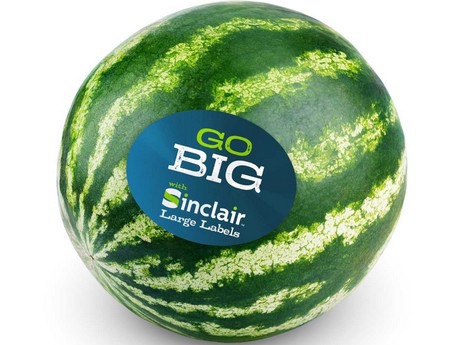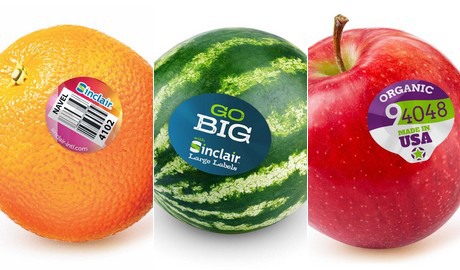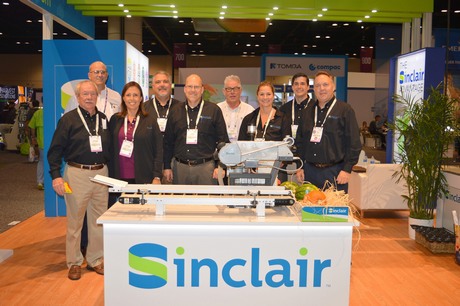Just as produce packaging has been evolving rapidly over the years, so too is produce labeling. Companies are seeing opportunities to market their brands better through more creative labels. Additionally, as the number of choices increases in the produce department, the need for labeling becomes even more apparent. Just the difference between an organic and conventional piece of fruit requires a label to shine a light on this for the consumer as well as the retailer.
As a result, companies like Sinclair say they are continually following the trends in labeling and labeling machinery, in order to keep up with producers' needs to stand out more. For example, in the last few weeks, the company launched four new label sizes geared toward melon growers/packers. According to Sinclair, the larger labels will not only provide better sustainable branding options, but also lends itself well to automation.
"Larger Labels by Sinclair is a sales & marketing campaign that was launched earlier this year at the National Watermelon Conference in Hawaii," explained Sinclair’s Marketing Manager – The Americas, Maria Montalvo. "It speaks to the new labels that are up to 3x2 inches in size – a first for Sinclair and an industry that was used to labeling by hand because no other supplier was able to produce an automated way of labeling these larger pieces of fruit. Now companies have the opportunity to automate their labeling with a customized V6 labeling system. These new label shapes and machine can label 120 - 400 fruits per minute and were engineered specifically for the melon industry to be launched at the start of their season."

Larger labels for melons that are up to 3x2 inches in size
Better accountability
Visibility is key to a company's branding which has been the case with the melon industry gradually seeing larger labels appropriate for their products. But visibility also extends to those that are handling these products, including shippers and retailers. A label's barcode can contain a lot of useful information for all those along the supply chain. One of the ways labels help is by improving identification between organic and conventional produce.
"We see a higher demand for labels for organically grown produce," Montalvo observed. "Over the last five years or more, consumers have migrated more and more to organically grown produce. Retailers struggle differentiating an organic apple from conventionally grown. Our labels highlight organic branding as well as the five digit PLU starting with a '9' which indicates organically grown produce. We have helped customers differentiate their organic from their conventional after their retailers confirmed miss-rings at checkouts for organics. In this example, labels are helping consumers and checkout personnel to quickly differentiate between organic and conventional. After all, miss-rings equate to lost revenue."
Montalvo added that the GS1 Databar barcode is increasingly being picked up by retailers because of its more detailed information in relation to the produce in question. "Essentially GS1 Databar, like PLU, assists retailers to ensure a quick and easy checkout at Point of Sale as well as providing information related to the brand owners that are supplying fresh produce," she said. "For example, with GS1 Databar, retailers are able to understand whether the apples of one supplier are moving faster than another."
Alternative labeling
Demonstrating another parallel with packaging trends in produce, labeling materials continue to be updated. Reduction in plastic use has been a topic of conversation in recent years and some companies are taking this on board with their products. It's no surprise then that labeling companies are considering alternative materials and methods to apply labels on produce, with some already having implemented changes.
"Feedback from Europe and other parts of the world indicate that consumers are looking for eco-friendly packaging solutions when shopping for groceries," Montalvo highlighted. "These solutions include the sourcing of recyclable, reusable and compostable materials. Sinclair currently prints all of its labels on certified compostable backing tape also known as Sinclair EcoLiner®." Montalvo also stated that Sinclair is very close to being able to offer a certified fully compostable label to the market which also has direct food contact FDA and EU certification and which includes compostable face film, compostable adhesive and compostable inks. An announcement is expected in the coming weeks.

Highlighting innovation at CPMA
Clearly, the world of labeling and labeling equipment is a dynamic one, moving rapidly in parallel with the produce industry as a whole. Automation, sustainability and innovation are key focus topics and ones that Sinclair are putting forward. At CPMA in Montreal this year, the company will be showcasing their new ideas in labeling, including demonstrating their new Pattern Labeler which was launched last year.
"Visitors to our booth have an opportunity to discuss their labeling needs with our Sinclair staff of experts," Montalvo shared. "Sinclair launched a new tray labeler - the Pattern Labeler 1 – which in fact we will be showcasing at this year’s CPMA. We invite everyone to stop by for a demo of the machine labeling fruits and vegetables in trays at high speeds. It’s perfect for product that is required to be sold in trays or boxes."
Sinclair's labels are used globally on various commodities. According to Montalvo, the company's machines also have the capability to span multiple pack types from trays to individual pieces of fruit and vegetables on sizers and graders.
"We have a label shape & size for an array of applications – anything from a lime/apricot to watermelons," she concluded. "In Canada, we typically label those commodities grown in greenhouses like: tomatoes, bell peppers, and cucumbers. Other commodities include apples and pears – a lot of what is sold in Canadian groceries is labeled with Sinclair food-safe labels. More than three decades ago, Sinclair pioneered automatic food-safe labeling – we want to continue to educate consumers, growers, shippers, packers and retailers about the benefits of labeling. Sinclair is an active member of CPMA, PMA and other produce associations around the world as well as participating in professional committees for standardization like GS1 and IFPS."
Attendees at CPMA in Montreal in April will be able to visit Sinclair and view the Pattern Labeler 1 machine at Booth #400.
For more information:
Maria Montalvo
Sinclair
Ph: +1 (559) 233-4500
mariam@sinclair-intl.com
www.sinclair-intl.com
